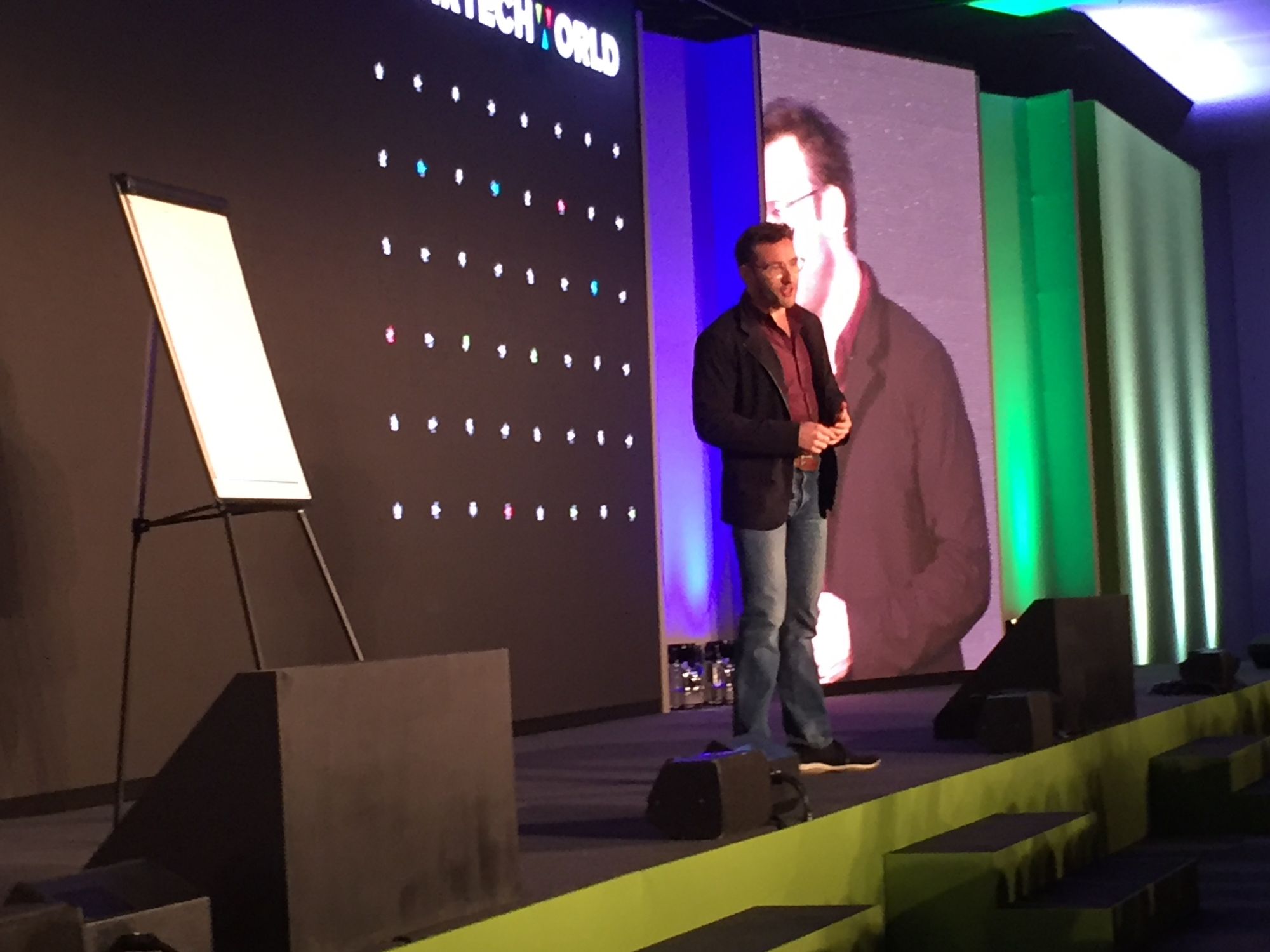Tony-os, Pathos, Logos
In the Netflix documentary “I’m not your guru” motivational speaker Tony Robbins is followed during one of his annual events during which a “small audience” of just 2,500 people (he often does events for 50k people in stadiums) come to a resort in Florida for 6 days, paying about $6k for their “Date with Destiny.”
We get to admire Tony’s glamorous Florida home, just a 20 min drive away from the resort. We see his enormous in-house gym. We see some of his art. We see he has a small, square, cold-water pool in his garden that he jumps in for 10 seconds, for some sort of motivational cool-down before a huge-ass black SUV pulls up to bring him to the resort just in time for the events of that day to start. As he gets out of his SUV, somebody puts his wireless microphone on him. Tony proceeds to do a walk-and-talk with his crew discussing the “mood in the room,” (by that time the audience has been warmed up with loud music and motivational fluffers for an hour or two), he does a few jumps on a small trampoline, makes a Michael Jackson-style twirl, and walks through the curtains on stage while pumping his fists. The audience goes crazy.
Tony Robbins is not what I'd describe as my type of guy.
The excessive display of wealth, his bragging about own accomplishments, name dropping left and right who he’s worked with (Clinton, Mother Teresa, Al Gore, Trump among many others — in case you’re wondering), the swearing. Promoting work through infomercials. And an audience that hopes to get their life fixed by paying a few thousand dollars for a seminar.
I’d consider myself pretty tolerant to people of all walks of life — I’m Dutch, this is (supposedly) our national pride. But this... is too much. Even for me.
I vividly remember watching this documentary in a hotelroom, just after arriving in Berlin for a visit to our office there. I had just picked up a way-too-large bucket of KFC fried chicken, and ate it sitting at the tiny hotel desk, staring at my laptop screen in disbelief.
What the actual f? Who is this guy, and why do people show up for this?

But then, 1 hour and 6 minutes into the documentary, Tony does an “intervention” with a girl from Brazil named Dawn (screenshot above). Her story is pretty horrific, I won’t repeat it here.
And everything changes.
For over an hour I’ve been thinking “how can this be, this guy is not real, this is a scam,” but then, as he talks to this girl. I buy in. This is legit. I cannot judge if this really has long lasting effect on people, but Tony is real. He wants to help people, and this is his way to do it. This is coming from the right place.
Since then, I bought some of his books, I rewatched the documentary once more. I watched numerous interviews. I watched his TED talk (the original TED, not the TEDx’s where seemingly everybody can get on stage). And, I must admit I have started to appreciate many of his philosophies. I won’t delute this post with what those philosophies are exactly, that’s not the point. I’m not convinced of his methods. I’m not a fan of his style. But that doesn’t mean the message is wrong.
A week or two ago, I finally sat down with my wife to watch the documentary with her. I gave her limited background. Watching somebody else watch something you’ve already seen yourself is always fun. I saw the same level of disgust in her face. Afterwards, we talked about it for quite some time. Unlike me, she wasn’t able to get over the Tony-as-a-personality barrier. When I explained his concepts to her, she got it, and also bought in to an extent. But watching this coming from him — nope, impossible. Wasn’t going to happen.
However, as I wrote a few weeks ago covering The Last Dance:
this is not a newsletter about random Netflix shows (yet). So, why would a sports documentary be worth watching as a person interested in managing engineers?
Or in this case: a documentary about a motivational speaker?
Tony Robbins and my reaction to him is an excellent case study on the importance of ethos.
Oh my god, that must be the longest introduction to the actual topic in blogging history. You’re welcome.
How do you convince somebody of something? How do you persuade people into action? How do you change somebody’s world view?
This is what the art of rhetoric is all about:
Rhetoric (/ˈrɛtərɪk/) is the art of persuasion, which along with grammar and logic, is one of the three ancient arts of discourse. Rhetoric aims to study the capacities of writers or speakers needed to inform, persuade, or motivate particular audiences in specific situations.
Rhetoric was heavily studied in the time of the ancient greeks, and Aristotle was of the people who started to codify this art form. He identified the three “audience appeals”:
Now I will not turn this into a lecture on rhetoric. If you’d like to learn more about this topic I will recommend you one of my favorite books of all time: Thank You for Arguing — which has an incredible mix of theory, practical knowledge, examples and humor.
I’m bringing this up because I mentioned my “journey” with Tony is an example of the importance of ethos. How is that?
While I was highly unspecific about what Tony’s real message is, if you know me a little bit, you’d expect that it’s likely to be logical. I’m a reasonably logical thinker. That logical message — the logos — was present in the Tony documentary very clearly. But I didn’t buy it.
If you even skim through the documentary quickly, you will see a lot of people crying, cheering, laughing. There is no lack of emotion — pathos — here. Even I, as a cold, level-headed, emotionally stable Dutch person approached tearing up with some of the stories. But until, indeed, that 1 hour and 6 minute moment, I didn’t buy it.
Why did I not buy it? Because Tony as a person, as a character — his ethos, is so repulsive to me. Quoting myself a few paragraphs back:
Tony Robbins is not what I'd describe as my type of guy.
Tony is not like me. Nor is he somebody I aspire to become. Therefore, it’s extremely hard for me to buy what he’s selling. That’s how people work. That’s ethos and rhetoric in action. If you cannot identify with the person who’s trying to convince you of something, if you’re too dissimilar, it’s not going to fly. Ain’t gonna happen. Unless the pathos gets extremely strong (again: 1 hour and 6 minutes in), and the resistance from the ethos level cracks.
Which brings me to my usual “cool story bro’, so why would I care?” trope.
Chances are high that you at some point will want to influence people, or convince them of something. The rules of ethos, pathos and logos apply to everybody — if they apply to Tony, they will apply to you too. If people don’t buy into you, they won’t buy into your ideas. Therefore, it’s vital that you level with people. It’s highly unbeneficial to distance yourself from your audience. The more you emphasize the distance (e.g. “I’m your boss, you do what I say”) the less buy-in you’ll be able to get.
Move to a higher floor. Move into a corner office. Get yourself a desk on an elevated podium (so you can look down on people). Get yourself a throne. Guess what: people will be less inclined to naturally believe what you’re telling them.
This is one of the struggles I have in more senior management positions. With most engineers, there’s a two, sometimes three level hierarchy gap between them and me. As a result, it’s essentially unavoidable to not be disconnected, and therefore for people to not really buy what I’m selling. Why would they care what I think (other than by authority, which doesn’t really count in this context)? What do I know about their reality, glancing down from my giant-ass Florida home with 3 infinity pools?
What can we do to avoid this?
Some ideas:
- Be (or appear) like your audience. In an engineering management context: if you can show you can contribute technically, that will help — you’re still “one of us,” so you probably know what you’re talking about and you're worth listening to.
- Deeply understand your audience. Listen what people have to say, and show you really understand their context.
Now, you may ask: so why is Tony Robbins so successful then? Well, not everybody is like me (and my wife). There’s clearly a huge audience in the world that thinks he’s great as a person: The American dream impersonated. Strong. Powerful. Just their type of guy! Somebody they aspire to be. And then, it works. If you’re a cold, level-headed Dutch person, it doesn’t (or at least it’s harder).
However, is this really ethos, or are motivational speakers in general just problematic for an audience like me?
I have a counter example: Simon Sinek. His message isn’t the same, but he’s also of the leadership “motivational speaker” persuasion. I think he’s great. He’s more modest. Funny. He may live in a giant-ass house, but even in he does — he doesn’t rub it in your face. Just my type of guy. Somebody more like what I aspire to be. So I’m buying whatever he’s selling (including all his books), no questions asked.
I even saw him live once (he was so close I could almost touch him, OMG OMG!!!1one)

By the way, if you’re not familiar with Simon, do yourself a favor: the golden circle, why leaders eat last, the infinite game.
So rhetorics. It’s a real thing. If your job involves convincing other people of things (spoiler alert: it does), considering familiarizing yourself with this art form, and start by leveling with your audience.
And read “Thank You For Arguing,” you won’t regret it.

